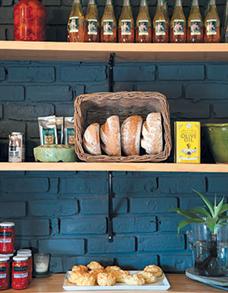Kathleen Hornby Walsh’s tips on planting your own herb garden (from the article ‘Country Strong’ (August 2014)
Caring for and maintaining your herbs:
• Water newly planted herbs regularly. Watering and drainage goes hand in hand, so rather give your herbs too little water than too much. After a good soaking, allow the water to drain away and the soil to dry off. Water again when the top 2 – 3cm of soil is dry to the touch.
• Mulch your herbs once a year with bulky organic material, such as shredded bark.
• Fertilising is very important, especially if you intend to use your herbs on a regular basis. During the growing season (August to April) fertilise at least once a month. During the winter months, one or two doses will be sufficient. Inorganic fertilising and heavy composting is not recommended because this produces sappy growth that’s more prone to disease and pests.
• Use any balanced fertiliser like 2:3:2. Always half the dosage given on the packaging. The reason for this is that the essential oils of herbs that grow with some ‘suffering’ or distress a bit are more concentrated, which increases their flavour, aroma and medicinal value.
• If your herbs get too much fertiliser, they will grow scraggly and be more susceptible to pests and diseases. Please note: if you are growing herbs for medicinal purposes do not use chemical fertiliser. Use good organic products.
• Pruning is essential to encourage healthy, bushy growth. Remove dead leaves and flowers on a regular basis. Should you frequently use your herbs, pruning may not be necessary as you would be pruning automatically.
Planting guide for popular herbs:
Basil – Plant with tomatoes. Repels flies and mosquitoes.
Chives – Plant with carrots.
Dill – Plant with cabbages. Keep away from carrots.
Mint – Plant near cabbage and tomatoes. Deters white cabbage butterflies/moths.
Oregano – Good companion to all vegetables.
Parsley – Plant near asparagus, corn and tomatoes.
Rosemary – Plant near cabbage, beans, carrots and sage.
Sage – Plant near rosemary, cabbage and carrots; away from cucumbers.
Thyme – Plant near cabbage.
What to avoid:
• Spraying chemicals on herb plants.
• Allowing flowers to turn to seeds.
• Not watering properly.
• Choosing unhealthy herb plants, if planting seedlings.
Two Acres’ garlic, onion and chilli spray:
• This spray is antibiotic, antiseptic and a broad-spectrum bactericidal, fungicidal and insecticidal.
• Use with discretion.
• It will deter or even kill beneficial pests also.
• Avoid getting into the eyes.
• Only spray in the early morning.
• Do not apply too much as it can burn tender plants.
• Rather spray less on the plants, two or three days in a row.
INGREDIENTS:
1 garlic head, roughly chopped
2 onions, roughly chopped
2 chillies, roughly chopped
2L warm water
15ml (1 tbsp) sunflower oil
15ml (1 tbsp) dishwashing liquid
METHOD:
- Place the garlic, onions and chillis in an old bucket with a lid. Cover with the warm water, close the container and allow to stand, 1 day.
- Strain the liquid through a fine sieve. Add the cooking oil, the dishwashing liquid and mix well. Dilute 250ml (1 cup) of the onion, chilli and garlic mixture to 1¼L (5 cups) of water and place in a spray canister.
- Use widely for aphids, cabbage butterfly, mites, scale, thrips, tomato flies, green flies, white flies, caterpillars, cutworms, red spiders, beetles, moths, ants, termites, fungi, bacteria, blight, slugs and snails. Use the mixture within 5 days.

